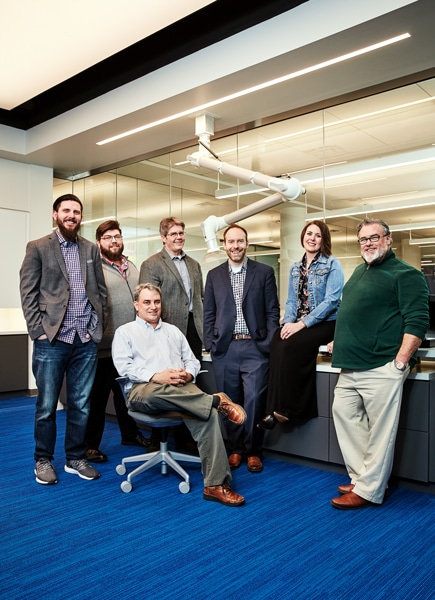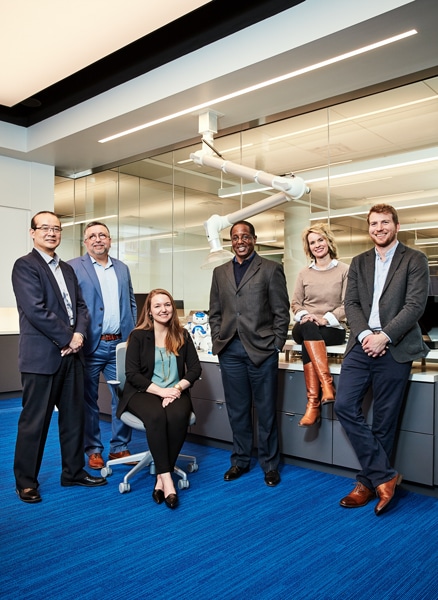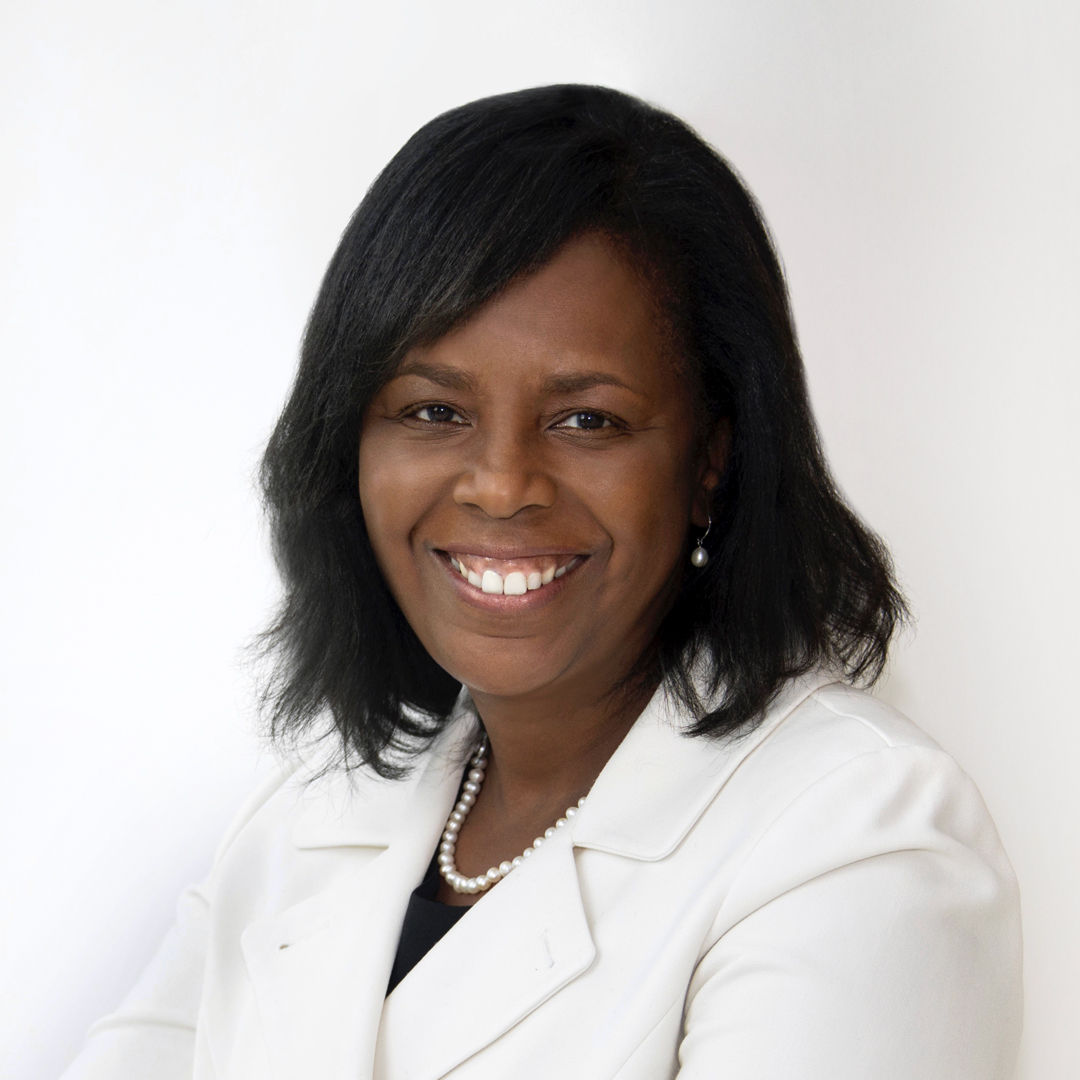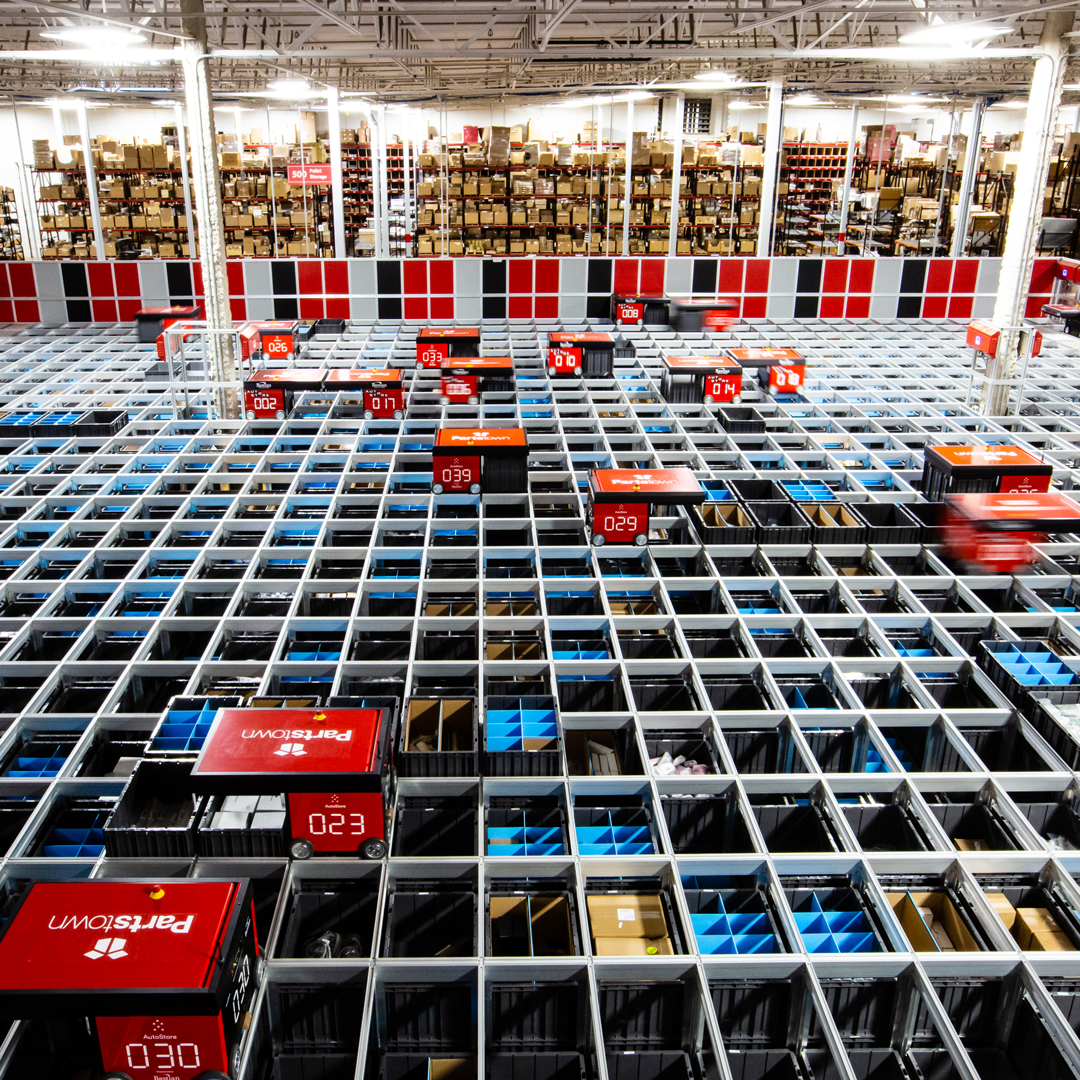On their RA’s birthday, a floor of Saint Louis University undergraduates propped open their doors and hushed each other. One uttered a command, and the students laughed and cheered as a chorus of Amazon Alexa devices sang “Happy Birthday” together.
“That’s probably the most unique usage we’ve heard of so far,” laughs Assistant Vice President of Technology Transformation Kyle Collins. The thrill of innovation is in those unforeseen discoveries—and, as Vice President, CIO, and Chief Innovation Officer David Hakanson points out, staff and students at SLU are uniquely suited.

Photo by Ashley Gieseking
“The students we attract are highly driven to achieve success in and out of the classroom,” he says. “There’s a lot of excitement about this technology, and we’re having open conversations about what we can accomplish.”
Hakanson and Collins have led a transformation of the university’s IT sector. Previously an operational support organization, it’s now a complete innovation center, where experiments and demos can drive changes in how the whole university functions. They give residents new ways to engage, students new ways to learn, and staff the tools they need to strategize about the university’s future.
One marquee story has been the Alexa at SLU initiative, by which every student room is now equipped with a Billiken-branded Amazon Echo device. Administered through Amazon Business, the devices have SLU-specific functions: students can ask Alexa about the library’s hours, for example, or about upcoming campus activities. To date, it’s the largest single deployment of such devices.
The last eighteen months have been a comprehensive cultural evolution for IT at SLU. Inside a nimble, start-up-like laboratory environment, staff and students can demo new technologies and experiment with potential futures for the university’s infrastructure. Curiosity drives change, student voices are taken seriously, and feedback from stakeholders guides the ongoing mission.
The continuing acceleration of tech integration made this change necessary, and the whole team is excited to report on real-world results and upcoming possibilities. The SLU IT innovation team join Hakanson and Collins for a Q&A below.
How do you describe SLU’s approach to innovation and technology?
Leslie Williams, Assistant Vice President and Chief of Staff: Our team takes an “anything is possible” approach with innovation at SLU. We pride ourselves on working hard, staying focused, and pushing the limits with new concepts. It is exciting to be a part of a team that is willing to test the boundaries and the higher-ed norm.
How have you integrated Amazon Alexa technology in your company quickly? Break down some of the steps you’ve taken.
Peter Juan, Assistant Vice President, Enterprise Architecture: I partnered with multiple ITS teams and led the proof of concept (PoC) review between Amazon Alexa and competitor devices. The data told us which IoT devices work best on our campus and how best to deploy and manage them. That effort proved our strategy of using very focused, data-driven PoC to confirm the appropriate architecture and to enable fast delivery.
Megan Greathouse-Gause, Director, Customer Service: My primary focus was on the end-user experience: designing the pilot, developing how-to guides, administering feedback surveys, organizing user test sessions, and working with the students to integrate different skills and accessories into their testing. After the test pilot, my focus turned to curating questions and answers for the SLU Alexa skill, assisting with setup, deploying the units, and training on support the devices once the program launched.
Lucas Guffey, Portfolio Analyst: For a deployment, I like to identify how the user will most enjoy interacting with the technology and what they should be able to produce from it. From there, involving stakeholders and gathering input so that insights and ideas from our community are taken advantage of and concerns are addressed.
What’s the overall vision for SLU’s relationship with and deployment of innovative consumer technologies?
Joey Pieper, Technologist II: I find it best to view the finished product through the eyes of the end user—in this case, our students. “Will this help me in my everyday life?” “Will this improve my ability to gather information?” “Does this product add value to the overall experience at SLU?” Gaining the ability to get campus information and complete tasks in such an informal/on-demand way is a great addition to the education students already receive.
Rob Day, Technologist II: Since coming to SLU, it has been my goal to not only keep technology current in our academic environment, but to be innovative in our technology development for our students and faculty. I developed this vision through years of being stuck in a break/fix cycle. I really found that staying ahead of problems was much more efficient—it takes a little more upfront effort but requires significantly less maintenance moving forward.
What were some of the major challenges?
Rob Day: A major challenge we faced was the actual implementation of Alexa into a secured, corporate environment. As we move forward, I feel that it is best to continue to test new things and think about the ever-shifting wants and needs of our students and faculty. The most unassuming technology may turn into the next big thing (with a little tweaking).
Dave Maddox, Associate Vice President and Chief Information Security Officer: From an information security and privacy point of view, it was our team’s responsibility to ensure the Amazon Echo Dots were deployed in a secure manner and that our students felt confident their privacy would be protected when interacting with the device.
Kyle Collins: We use the Amazon Web Services (AWS) Alexa for Business platform for central management. The device doesn’t know who’s talking, and there are no granular details reported to us. We’ve made the opt-out very easy. Students can simply unplug the device and leave it in a drawer; it just has to be there when they check out. Most every concern has been defused.
What have you learned so far—how has your approach evolved, and how are you continuing to grow?
Angela Schubert, Graduate Assistant, Department of Innovation: I have learned the power of great partnerships, especially when it comes to achieving lofty goals. In addition to meeting our goal on schedule, we broke records and had a lot of fun! When people are having fun and feel free to bring their ideas to the table, they stay engaged and improve processes. I have been on other projects (outside of SLU) where orders were handed down and suggestions ignored—that is the quickest way to turn people off.
Kyle Collins: Good IT people are curious. We’re continuing to work with university staff to try things quickly, check how they work, and move on. There’s a spark of excitement here.
David Hakanson: I am very proud of the work that the Saint Louis University IT team has done in helping to transform us from solely an operational focus to an innovation engine and technology enabler. Innovative projects, such as Alexa at SLU, have been the spark that brings great minds alike and creates excitement not only in the IT organization but throughout the university. We will continue to find new and innovative ideas where we can bring different groups together to look at the unimaginable and explore how we can continue to lead in innovation.


